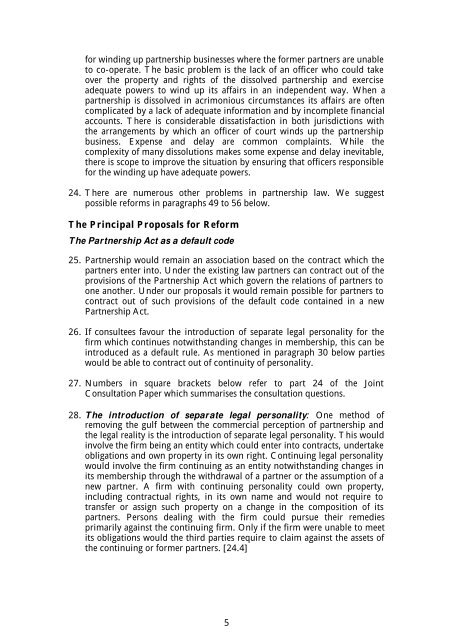Partnership Law Consultation Summary - Law Commission
Partnership Law Consultation Summary - Law Commission
Partnership Law Consultation Summary - Law Commission
Create successful ePaper yourself
Turn your PDF publications into a flip-book with our unique Google optimized e-Paper software.
for winding up partnership businesses where the former partners are unable<br />
to co-operate. The basic problem is the lack of an officer who could take<br />
over the property and rights of the dissolved partnership and exercise<br />
adequate powers to wind up its affairs in an independent way. When a<br />
partnership is dissolved in acrimonious circumstances its affairs are often<br />
complicated by a lack of adequate information and by incomplete financial<br />
accounts. There is considerable dissatisfaction in both jurisdictions with<br />
the arrangements by which an officer of court winds up the partnership<br />
business. Expense and delay are common complaints. While the<br />
complexity of many dissolutions makes some expense and delay inevitable,<br />
there is scope to improve the situation by ensuring that officers responsible<br />
for the winding up have adequate powers.<br />
24. There are numerous other problems in partnership law. We suggest<br />
possible reforms in paragraphs 49 to 56 below.<br />
The Principal Proposals for Reform<br />
The <strong>Partnership</strong> Act as a default code<br />
25. <strong>Partnership</strong> would remain an association based on the contract which the<br />
partners enter into. Under the existing law partners can contract out of the<br />
provisions of the <strong>Partnership</strong> Act which govern the relations of partners to<br />
one another. Under our proposals it would remain possible for partners to<br />
contract out of such provisions of the default code contained in a new<br />
<strong>Partnership</strong> Act.<br />
26. If consultees favour the introduction of separate legal personality for the<br />
firm which continues notwithstanding changes in membership, this can be<br />
introduced as a default rule. As mentioned in paragraph 30 below parties<br />
would be able to contract out of continuity of personality.<br />
27. Numbers in square brackets below refer to part 24 of the Joint<br />
<strong>Consultation</strong> Paper which summarises the consultation questions.<br />
28. The introduction of separate legal personality: One method of<br />
removing the gulf between the commercial perception of partnership and<br />
the legal reality is the introduction of separate legal personality. This would<br />
involve the firm being an entity which could enter into contracts, undertake<br />
obligations and own property in its own right. Continuing legal personality<br />
would involve the firm continuing as an entity notwithstanding changes in<br />
its membership through the withdrawal of a partner or the assumption of a<br />
new partner. A firm with continuing personality could own property,<br />
including contractual rights, in its own name and would not require to<br />
transfer or assign such property on a change in the composition of its<br />
partners. Persons dealing with the firm could pursue their remedies<br />
primarily against the continuing firm. Only if the firm were unable to meet<br />
its obligations would the third parties require to claim against the assets of<br />
the continuing or former partners. [24.4]<br />
5

















